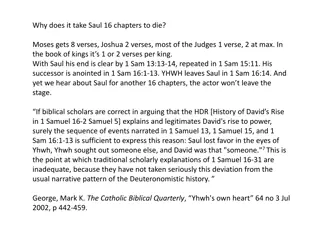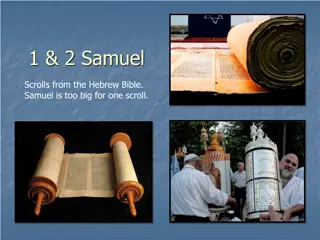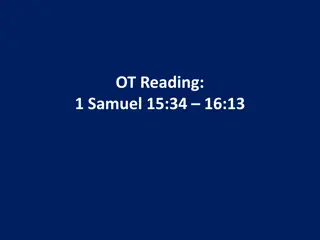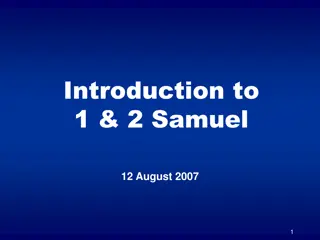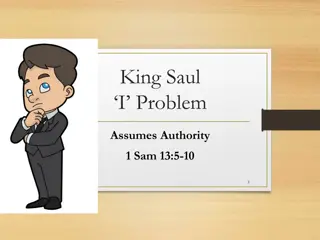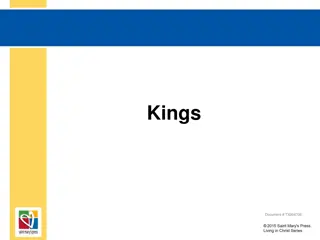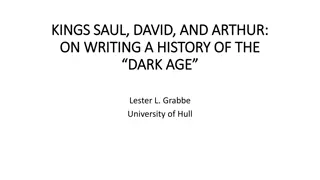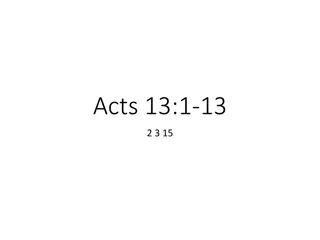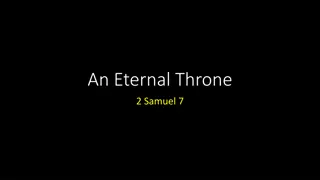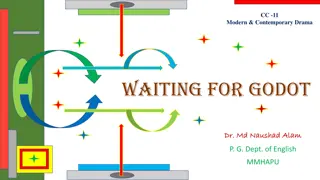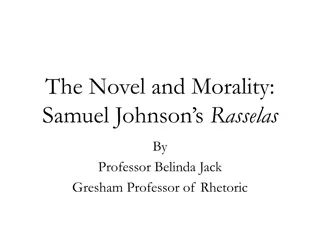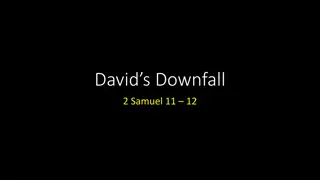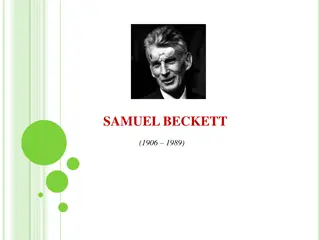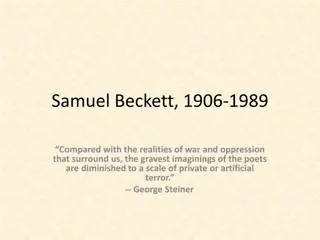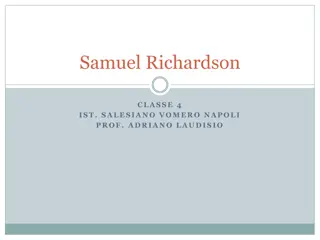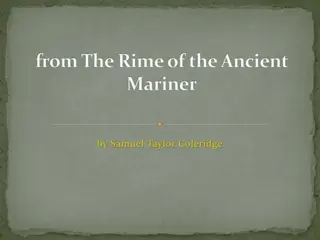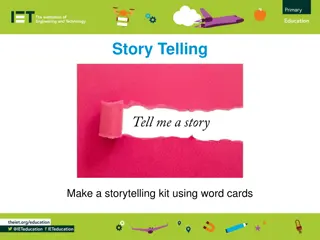Word Play on Saul and David in 1 Samuel
Explore the intricate wordplay surrounding Saul and David in 1 Samuel, where Saul seems to not recognize David despite their previous interactions. Delve into the themes of grief, rejection, and divine providence as the narrative unfolds to reveal God's chosen king. Samuel's discernment, Saul's turmoil, and David's anointing are all key elements in this captivating biblical story.
Download Presentation

Please find below an Image/Link to download the presentation.
The content on the website is provided AS IS for your information and personal use only. It may not be sold, licensed, or shared on other websites without obtaining consent from the author. Download presentation by click this link. If you encounter any issues during the download, it is possible that the publisher has removed the file from their server.
E N D
Presentation Transcript
Why does Saul appear to not know who David is in 1 Samuel 17:55-58? Word play on
Word play on 1 Samuel 15:35 And Samuel did not see Saul again until the day of his death, but Samuel grieved over Saul. And the LORD regretted that he had made Saul king over Israel. 1 Samuel 16:1 The LORD said to Samuel, "How long will you grieve over Saul, since I have rejected him from being king over Israel? Fill your horn with oil, and go. I will send you to Jesse the Bethlehemite, for I have provided for myself a king among his sons.
Word play on Genesis 22:8 Abraham said, "God will provide for himself the lamb for a burnt offering, my son." So they went both of them together. Genesis 22:14 So Abraham called the name of that place, "The LORD will provide"; as it is said to this day, "On the mount of the LORD it shall be provided."
Word play on 1 Samuel 15:35 And Samuel did not see Saul again until the day of his death, but Samuel grieved over Saul. And the LORD regretted that he had made Saul king over Israel. 1 Samuel 16:1 The LORD said to Samuel, "How long will you grieve over Saul, since I have rejected him from being king over Israel? Fill your horn with oil, and go. I will send you to Jesse the Bethlehemite, for I have provided for myself a king among his sons. Samuel is grieving over Saul. God will provide ( see for himself ) a new king. How will God choose this new king?
Word play on 16:6 When they came, he looked on Eliab and thought, "Surely the LORD's anointed is before him." Samuel does some looking but does he see correctly? 16:7 But the LORD said to Samuel, "Do not look on his appearance or on the height of his stature, because I have rejected him. For the LORD sees not as man sees: man looks on the outward appearance, but the LORD looks on the heart." Samuel sees the outward appearance. God sees the heart.
Word play on 16:13 Then Samuel took the horn of oil and anointed him in the midst of his brothers. And the Spirit of the LORD rushed upon David from that day forward. And Samuel rose up and went to Ramah. 16:14 Now the Spirit of the LORD departed from Saul, and a harmful spirit from the LORD tormented him. 16:15-16 And Saul's servants said to him, "Behold now, a harmful spirit from God is tormenting you. Let our lord now command your servants who are before you to seek out a man who is skillful in playing the lyre, and when the harmful spirit from God is upon you, he will play it, and you will be well." Who is seeing to the heart of the matter here?
Word play on 16:13 Then Samuel took the horn of oil and anointed him in the midst of his brothers. And the Spirit of the LORD rushed upon David from that day forward. And Samuel rose up and went to Ramah. 16:14 Now the Spirit of the LORD departed from Saul, and a harmful spirit from the LORD tormented him. 16:15-16 And Saul's servants said to him, "Behold now, a harmful spirit from God is tormenting you. Let our lord now command your servants who are before you to seek out a man who is skillful in playing the lyre, and when the harmful spirit from God is upon you, he will play it, and you will be well." Saul s servants don t just see appearances. Surprisingly, they know what the narrator has told us. They see the heart of the matter, so to speak.
Word play on 16:17 So Saul said to his servants, "Provide for me a man who can play well and bring him to me." Who else was going to provide a man for himself?
Word play on 16:17 So Saul said to his servants, "Provide for me a man who can play well and bring him to me." Who else was going to provide a man for himself? 1 Samuel 16:1 The LORD said to Samuel, "How long will you grieve over Saul, since I have rejected him from being king over Israel? Fill your horn with oil, and go. I will send you to Jesse the Bethlehemite, for I have provided for myself a king among his sons.
Word play on 16:17 So Saul said to his servants, "Provide for me a man who can play well and bring him to me." Who else was going to provide a man for himself? 1 Samuel 16:1 The LORD said to Samuel, "How long will you grieve over Saul, since I have rejected him from being king over Israel? Fill your horn with oil, and go. I will send you to Jesse the Bethlehemite, for I have provided for myself a king among his sons. Both YHWH and Saul choose David but with very different insight. YHWH has chosen David as the next king. Saul will end up choosing a man for his inner court, not knowing that that man is God s chosen to replace him.
Word play on 16:17 So Saul said to his servants, "Provide for me a man who can play well and bring him to me." How will Saul s servants answer? How will they see? By mere appearances?
Word play on 16:17 So Saul said to his servants, "Provide for me a man who can play well and bring him to me." How will Saul s servants answer? How will they see? By mere appearances? 16:18 One of the young men answered, "Behold, I have seen a son of Jesse the Bethlehemite, who is skillful in playing, a man of valor, a man of war, prudent in speech, and a man of good presence, and the LORD is with him."
Word play on 16:17 So Saul said to his servants, "Provide for me a man who can play well and bring him to me." How will Saul s servants answer? How will they see? By mere appearances? 16:18 One of the young men answered, "Behold, I have seen a son of Jesse the Bethlehemite, who is skillful in playing, a man of valor, a man of war, prudent in speech, and a man of good presence, and the LORD is with him." This servant sees well. Better than Samuel (v 7). Samuel and Saul aren t seeing the heart.
Word play on 17:24 All the men of Israel, when they saw the man, fled from him and were much afraid. 17:25 And the men of Israel said, "Have you seen this man who has come up? Surely he has come up to defy Israel. And the king will enrich the man who kills him with great riches and will give him his daughter and make his father's house free in Israel." How do the men of Israel see? Do they see as God sees? To the heart of the matter? Or do they look merely at appearances?
Word play on 17:28 Now Eliab his eldest brother heard when he spoke to the men. And Eliab's anger was kindled against David, and he said, "Why have you come down? And with whom have you left those few sheep in the wilderness? I know your presumption and the evil of your heart, for you have come down to see the battle." Despite what he claims, does Eliab see the heart of David or does he see mere appearances?
Word play on 17:42 And when the Philistine looked and saw David, he disdained him, for he was but a youth, ruddy and handsome in appearance. Does Goliath see David correctly or does he misjudge him?
Word play on 17:51 Then David ran and stood over the Philistine and took his sword and drew it out of its sheath and killed him and cut off his head with it. When the Philistines saw that their champion was dead, they fled. At this point David s hidden potential becomes evident to all and the Philistines see how they have been miss-seeing him.
Word play on 17:55 As soon as Saul saw David go out against the Philistine, he said to Abner, the commander of the army, "Abner, whose son is this youth?" And Abner said, "As your soul lives, O king, I do not know." What/How is Saul seeing now?
Word play on 17:55 As soon as Saul saw David go out against the Philistine, he said to Abner, the commander of the army, "Abner, whose son is this youth?" And Abner said, "As your soul lives, O king, I do not know." What/How is Saul seeing now? David had not defeated Goliath yet but maybe Saul is starting to wonder? Everything may not be as it appears. Who is this youth who s been in his court? Where did he get such courage? And who is that daddy of his Jesse? Hmm Abner is like I donno. The servants picked him!
Word play on 18:15 And when Saul saw that he had great success, he stood in fearful awe of him. 18:28-29 But when Saul saw and knew that the LORD was with David, and that Michal, Saul's daughter, loved him, Saul was even more afraid of David. So Saul was David's enemy continually. What/How is Saul seeing now?
Word play on 1 Samuel 15:23 For rebellion is as the sin of divination, and presumption is as iniquity and idolatry. Because you have rejected the word of the LORD, he has also rejected you from being king." Why can't Saul see well? Because God is against him at this point. God has rejected him as king torn the kingdom from him taken from him His Spirit sent him a harmful Spirit 1 Samuel 15:28 And Samuel said to him, "The LORD has torn the kingdom of Israel from you this day and has given it to a neighbor of yours, who is better than you. 1 Samuel 16:14 Now the Spirit of the LORD departed from Saul, and a harmful spirit from the LORD tormented him. Saul can't see because God is against him. Saul only sees David s true colours when he s already embedded in Saul s court, and army, and family.
Also a word play on Thematically parallels the word play
Word play on 1 Samuel 16:1 The LORD said to Samuel, "How long will you grieve over Saul, since I have rejected him from being king over Israel? Fill your horn with oil, and go. I will send you to Jesse the Bethlehemite, for I have provided for myself a king among his sons. 16:2 And Samuel said, "How can I go? If Saul hears it, he will kill me." And the LORD said, "Take a heifer with you and say, 'I have come to sacrifice to the LORD.'
Word play on 1 Samuel 16:1 The LORD said to Samuel, "How long will you grieve over Saul, since I have rejected him from being king over Israel? Fill your horn with oil, and go. I will send you to Jesse the Bethlehemite, for I have provided for myself a king among his sons. 16:2 And Samuel said, "How can I go? If Saul hears it, he will kill me." And the LORD said, "Take a heifer with you and say, 'I have come to sacrifice to the LORD.' Polzin (p 159) We thus possess information about the trip s true purpose, the anointing of Saul s successor; we look upon the heart of the trip.
Word play on 1 Samuel 16:1 The LORD said to Samuel, "How long will you grieve over Saul, since I have rejected him from being king over Israel? Fill your horn with oil, and go. I will send you to Jesse the Bethlehemite, for I have provided for myself a king among his sons. 16:2 And Samuel said, "How can I go? If Saul hears it, he will kill me." And the LORD said, "Take a heifer with you and say, 'I have come to sacrifice to the LORD.' Polzin (p 159) But then God responds to Samuel s fears by inventing a subterfuge, thus creating the apparent reason for the trip: And the LORD said, Say I have come to sacrifice (v.2). The narrative distance here between coming and going represents the ideological distance between appearance and reality.
Word play on 16:4 Samuel did what the LORD commanded and came to Bethlehem. The elders of the city came to meet him trembling and said, "Do you come peaceably?" 16:5 And he said, "Peaceably; I have come to sacrifice to the LORD. Consecrate yourselves, and come with me to the sacrifice." And he consecrated Jesse and his sons and invited them to the sacrifice. Polzin (p 159) No matter that God speaks to Samuel or vice versa, that Samuel speaks to the elders or Bethlehem or vice versa, or finally that the narrator speaks to the reader. In all these cases the spatial shifter indicating movement from Ramah to Bethlehem is a going (halak) when its true purpose is being referred to, and a coming (ba) when its sacrificial subterfuge is in focus. From God s spatial perspective (Ramah), Samuel goes to anoint; from the point of view of those at his destination (Bethlehem), Samuel comes to sacrifice.
Word play on 16:4 Samuel did what the LORD commanded and came to Bethlehem. The elders of the city came to meet him trembling and said, "Do you come peaceably?" 16:5 And he said, "Peaceably; I have come to sacrifice to the LORD. Consecrate yourselves, and come with me to the sacrifice." And he consecrated Jesse and his sons and invited them to the sacrifice. Polzin (p 159) Of course the sacrifice is never reported as taking place in the story because the anointing of David is the heart of the matter, whereas the sacrifice is only outward appearance
Word play on Polzin continues to track in the rest of 1 Samuel 16, as Samuel goes about the process of choosing David and as Saul chooses David. On page 161 Polzin summarizes: As with the ideological implications of ba earlier in the chapter, so also here [v. 17 and 21] : to come means to be seen according to appearances, as people see, rather than according to the inner truth, as God sees. The shifting spatial perspectives indicated by the narrator s precise choice of words help to indicate the ideological perspective of the author. It may appear to Saul and his retinue that David is the answer to their problem; up to a point he is. Nevertheless, the heart of the matter, as the reader already knows, is that Saul is really helping to bring about his own downfall. God s having David brought [v. 12 hiphil of ] to Samuel marks its true purpose: to make a king; David s coming to comfort Saul [v. 21] merely masks its true purpose: to unmake one.


